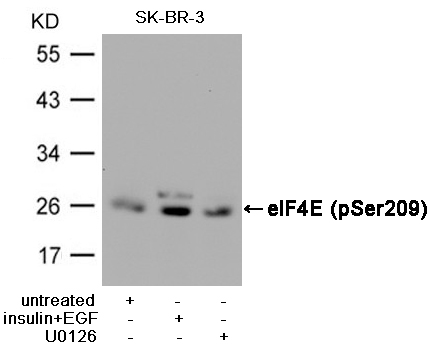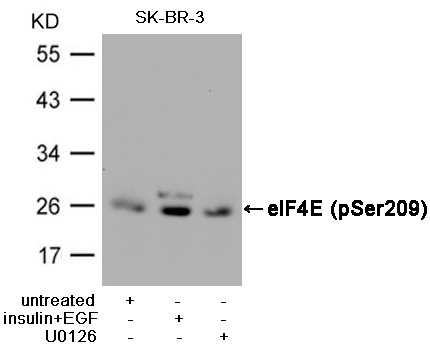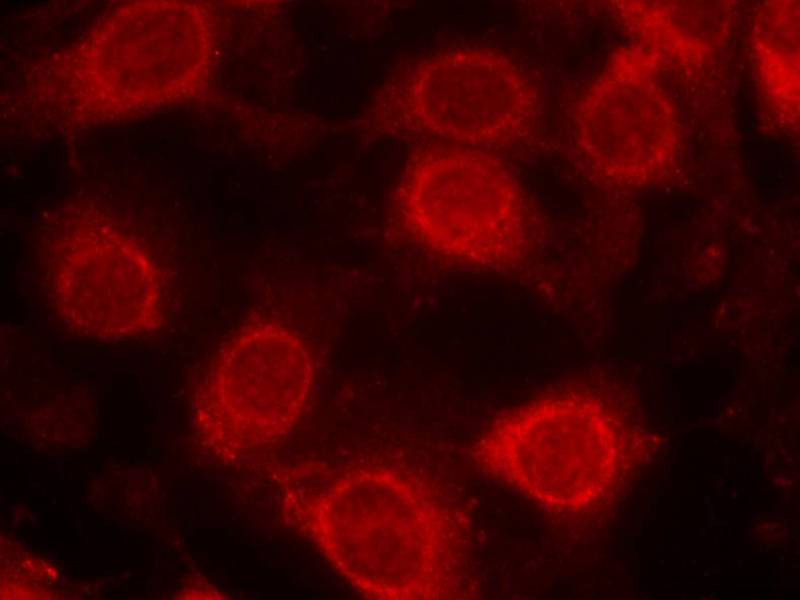


| WB | 咨询技术 | Human,Mouse,Rat |
| IF | 咨询技术 | Human,Mouse,Rat |
| IHC | 1/50-1/100 | Human,Mouse,Rat |
| ICC | 1/100-1/200 | Human,Mouse,Rat |
| FCM | 咨询技术 | Human,Mouse,Rat |
| Elisa | 咨询技术 | Human,Mouse,Rat |
| Aliases | mRNA cap-binding protein; eIF-4F 25 kDa subunit; |
| Entrez GeneID | 1977; |
| WB Predicted band size | 25kDa |
| Host/Isotype | Rabbit IgG |
| Antibody Type | Primary antibody |
| Storage | Store at 4°C short term. Aliquot and store at -20°C long term. Avoid freeze/thaw cycles. |
| Species Reactivity | Human |
| Immunogen | Peptide sequence around phosphorylation site of serine 209 (S-G-S(p)-T-T) derived from Human eIF4E. |
| Formulation | Purified antibody in PBS with 0.05% sodium azide. |
+ +
以下是关于eIF4E(Phospho-Ser209)抗体的3篇参考文献及其摘要概括:
---
1. **文献名称**: *"Altered eIF4E S209 phosphorylation drives selective mRNA translation in cancer"*
**作者**: Hsieh AC, et al.
**摘要**: 该研究探讨了eIF4E在Ser209位点的磷酸化如何促进癌症中特定促肿瘤mRNA的翻译。通过使用Phospho-Ser209特异性抗体,作者发现磷酸化eIF4E通过增强癌基因(如c-Myc)的翻译驱动肿瘤代谢重编程,并验证了该抗体在检测肿瘤组织中的磷酸化状态的应用。
---
2. **文献名称**: *"Phosphorylation of eIF4E at Ser209 is required for mRNA nuclear export and cellular transformation"*
**作者**: Topisirovic I, et al.
**摘要**: 研究揭示了eIF4E在Ser209的磷酸化对mRNA从细胞核到细胞质的转运至关重要。通过特异性抗体检测,作者证明磷酸化eIF4E通过结合mRNA帽结构介导致癌mRNA的核输出,并促进细胞恶性转化,为癌症治疗提供了潜在靶点。
---
3. **文献名称**: *"The mTOR-regulated phosphoproteome reveals a mechanism of mTORC1-mediated inhibition of growth factor signaling"*
**作者**: Yu Y, et al.
**摘要**: 该研究通过磷酸化蛋白质组学分析,发现mTORC1信号通路通过调控eIF4E(Ser209)的磷酸化抑制生长因子信号。使用Phospho-Ser209抗体验证了mTOR抑制剂对eIF4E磷酸化水平的动态影响,揭示了其在翻译起始调控中的核心作用。
---
这些文献均利用eIF4E(Phospho-Ser209)抗体揭示了该修饰在癌症、翻译调控及信号通路中的功能,适用于Western blot、机制研究等场景。如需具体实验细节,建议进一步查阅原文方法部分。
The eIF4E (Phospho-Ser209) antibody is a critical tool for studying the regulation of eukaryotic translation initiation factor 4E (eIF4E), a cap-binding protein essential for mRNA recruitment to ribosomes. Phosphorylation at serine 209 (Ser209) modulates eIF4E activity, enhancing its interaction with the mRNA 5' cap and promoting translation of oncogenic proteins (e.g., cyclins, c-Myc). This post-translational modification is primarily catalyzed by MNK kinases downstream of RAS/MAPK and PI3K/AKT/mTOR pathways, linking growth signals to protein synthesis.
The antibody specifically detects phosphorylated Ser209. enabling researchers to investigate eIF4E activation in contexts like cancer, viral infection, and cellular stress. Overexpression of phosphorylated eIF4E is associated with tumor progression, metastasis, and therapy resistance, making it a biomarker in oncology studies. Applications include Western blotting, immunofluorescence, and immunohistochemistry to assess phosphorylation status in cell lines, tissues, or preclinical models.
By targeting this modification, the antibody also aids in evaluating MNK inhibitors or other therapeutic strategies aimed at disrupting oncogenic translation. Its utility extends to elucidating mechanisms of cap-dependent translation and feedback loops involving 4E-BP1. a key eIF4E-binding repressor. Overall, the eIF4E (Phospho-Ser209) antibody is indispensable for translational control research and drug development targeting malignancy-related signaling networks.
×